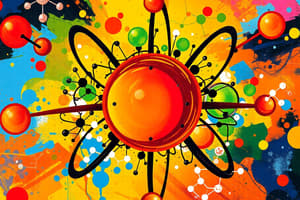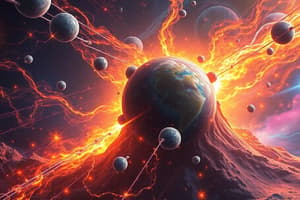Podcast
Questions and Answers
What happens in a chemical reaction?
What happens in a chemical reaction?
- Matter disappears
- Matter changes color
- New substances are formed (correct)
- Matter remains the same
Where are protons and neutrons located in an atom?
Where are protons and neutrons located in an atom?
- In the electron cloud
- In the nucleus (correct)
- Outside the atom
- Embedded in the electron orbits
What determines the elemental identity of an atom?
What determines the elemental identity of an atom?
- Number of neutrons
- Number of protons (correct)
- Number of electrons
- Number of photons
What do acids do when dissolved in water?
What do acids do when dissolved in water?
What is the main focus of chemistry?
What is the main focus of chemistry?
Why is understanding chemical reactions important?
Why is understanding chemical reactions important?
Which type of elements tend to form positively charged ions when they react with non-metals?
Which type of elements tend to form positively charged ions when they react with non-metals?
What type of bonds can carbon atoms form with other carbon atoms and other elements?
What type of bonds can carbon atoms form with other carbon atoms and other elements?
In which category do elements fall that are generally poor conductors of heat and electricity?
In which category do elements fall that are generally poor conductors of heat and electricity?
What happens to metals when they react with non-metals?
What happens to metals when they react with non-metals?
Which type of elements are essential in pH regulation in living organisms?
Which type of elements are essential in pH regulation in living organisms?
What is the ability of carbon atoms to form covalent bonds with other carbon atoms and elements the basis for?
What is the ability of carbon atoms to form covalent bonds with other carbon atoms and elements the basis for?
Study Notes
Exploring the World of Chemistry
Chemistry is a fascinating discipline that seeks to understand the composition, properties, and interactions of matter at the most fundamental level. Let's delve into some key aspects of chemistry to grasp a better understanding of this subject.
Chemical Reactions
A chemical reaction occurs when one or more substances are transformed into new substances. These reactions produce new molecules, different from the original ones, through the breaking and forming of chemical bonds. Reactions can be classified into several categories, including synthesis, decomposition, and combustion, to name a few. Understanding chemical reactions is pivotal in comprehending how and why matter changes and transforms.
Atomic Structure
The atomic structure refers to the arrangement of particles within an atom, mainly the protons, neutrons, and electrons. Protons and neutrons are found in the nucleus, and electrons orbit around it. The number of protons in an atom determines its elemental identity. Understanding atomic structure can help us visualize the fundamental building blocks of matter and how they interact with each other.
Acids and Bases
Acids and bases are essential concepts in chemistry, and their reactions are fundamental to many chemical processes. Acids are substances that donate protons (H+ ions) when dissolved in water, while bases are substances that accept protons. Acid–base reactions are essential in various contexts, such as pH regulation in living organisms and the neutralization of acids and bases in chemical reactions.
Metals and Non-metals
Metals and non-metals are two broad categories of elements, each with distinct properties and characteristics. Metals are generally good conductors of heat and electricity and tend to form positively charged ions when they react with non-metals. Non-metals, on the other hand, are generally poor conductors of heat and electricity and tend to form negatively charged ions when they react with metals. These classifications help us understand and predict the chemical behaviors and properties of elements.
Carbon and Its Compounds
Carbon is a versatile element that forms a diverse array of compounds. Carbon atoms have the ability to form covalent bonds with other carbon atoms and other elements, creating the backbone of organic molecules and the basis for life at the molecular level. Carbon-containing compounds are found in various contexts, including fuels, plastics, and pharmaceuticals. Understanding the properties and behavior of carbon compounds is crucial in various fields, including chemistry, biology, and materials science.
These subtopics are fundamental to understanding chemistry and are the building blocks on which more advanced concepts are built. By delving into these concepts and gaining a strong foundation in chemistry, you will be able to comprehend and apply these principles to the world around you.
Studying That Suits You
Use AI to generate personalized quizzes and flashcards to suit your learning preferences.
Description
Test your knowledge on key aspects of chemistry including chemical reactions, atomic structure, acids and bases, metals and non-metals, and carbon compounds. Understanding these fundamental concepts is crucial to comprehend the composition, properties, and interactions of matter at a basic level.




